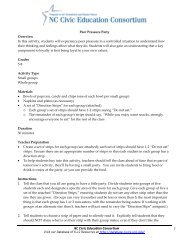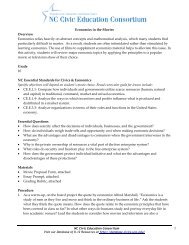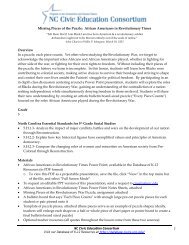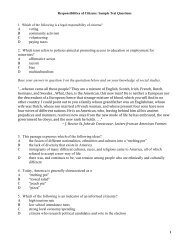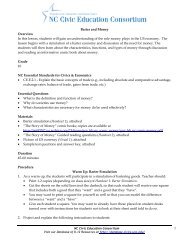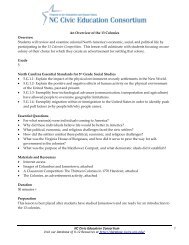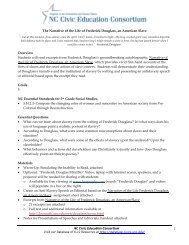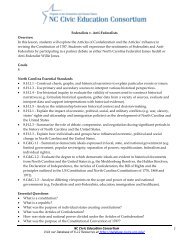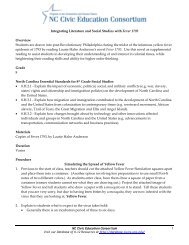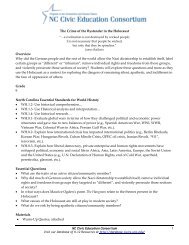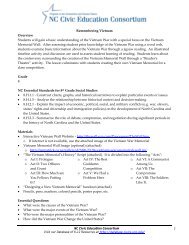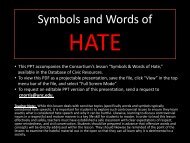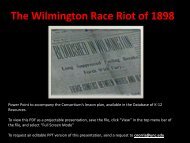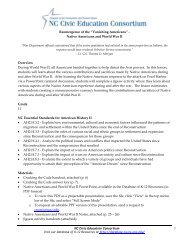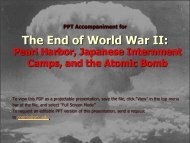American Revolution - Database of K-12 Resources
American Revolution - Database of K-12 Resources
American Revolution - Database of K-12 Resources
Create successful ePaper yourself
Turn your PDF publications into a flip-book with our unique Google optimized e-Paper software.
America’s <strong>Revolution</strong>ary Spirit- ANSWER KEY<br />
*Answers will vary for Columns 2 and pictures/symbols will vary for Column 3<br />
Tax or Event Definition<br />
Writs <strong>of</strong> assistance A legal document that serves as a general search warrant to British <strong>of</strong>ficers. This document enabled <strong>of</strong>ficials to inspect not only<br />
shops and warehouses, but also private homes.<br />
Albany Plan <strong>of</strong> Union, A plan to place the British North <strong>American</strong> colonies under a more centralized government. The plan was adopted on July 10, 1754,<br />
1754<br />
by representatives from seven <strong>of</strong> the British North <strong>American</strong> colonies. Although never carried out, it was the first important plan to<br />
conceive <strong>of</strong> the colonies as a collective whole united under one government.<br />
Proclamation <strong>of</strong> 1763 This Proclamation was issued by King George III to organize Britain's new North <strong>American</strong> empire and to stabilize relations with<br />
Native North <strong>American</strong>s through regulation <strong>of</strong> trade, settlement, and land purchases on the western frontier. The Proclamation <strong>of</strong><br />
1763 forbade English colonists to live west <strong>of</strong> the Appalachian Mountains.<br />
Sugar Act, 1764 The Sugar Act set a tax on sugar and expanded the list <strong>of</strong> taxable items to include specified wines and cloth, c<strong>of</strong>fee, tropical foods<br />
and silk.<br />
Quartering Act, 1765 This act required the colonies to provide the basic needs <strong>of</strong> British soldiers- specified items included housing, cooking utensils,<br />
firewood and candles.<br />
Stamp Act, 1765 The Stamp Act <strong>of</strong> 1765 was a tax imposed by the British Parliament on the colonies that required them to pay a tax on every piece<br />
<strong>of</strong> printed paper they used (legal documents, licenses, ship’s papers, newspapers, etc.). The money collected by the Stamp Act was<br />
Stamp Act Congress,<br />
1765<br />
to be used to help pay the costs <strong>of</strong> defending and protecting the <strong>American</strong> frontier.<br />
The Stamp Act Congress convened in New York City on October 7 with nine colonies in attendance to discuss and act upon the<br />
Stamp Act. The delegates approved a 14-point Declaration <strong>of</strong> Rights and Grievances. The statement said that colonial taxation could<br />
only be carried out by their own assemblies, not Great Britain.<br />
Declaratory Act <strong>of</strong> 1766 This act <strong>of</strong> the Parliament <strong>of</strong> Great Britain was one in a series <strong>of</strong> resolutions passed attempting to regulate the behavior <strong>of</strong> the<br />
colonies. It stated that Parliament had the right to make laws for the colonies in all matters –including taxation.<br />
Sons <strong>of</strong> Liberty A secret organization <strong>of</strong> <strong>American</strong> colonists formed initially to protest the Stamp Act. Members <strong>of</strong> the group, including merchants,<br />
Non-Importation<br />
Association<br />
(1768)/boycotts<br />
businessmen, lawyers, journalists, and others, took on the motto "no taxation without representation."<br />
The Non-Importation Agreements were a series <strong>of</strong> commercial restrictions adopted by <strong>American</strong> colonists to protest British taxation.<br />
Merchants in New York, Boston and Philadelphia agreed collectively to boycott British imports until Parliament repealed the Stamp<br />
Act.<br />
Boston Massacre, 1770 During the Boston Massacre, five civilian colonists were killed by British soldiers. It was the culmination <strong>of</strong> civilian-military tensions<br />
that had been growing since royal troops first appeared in Massachusetts in October 1768 to enforce the heavy tax burden.<br />
Boston Tea Party, 1773 The Boston Tea Party was a direct action protest by colonists in Boston against the British government. On December 16, 1773, after<br />
<strong>of</strong>ficials in Boston refused to return three shiploads <strong>of</strong> taxed tea to Britain, a group <strong>of</strong> colonists boarded the ships and destroyed the<br />
tea by throwing it into Boston Harbor.



